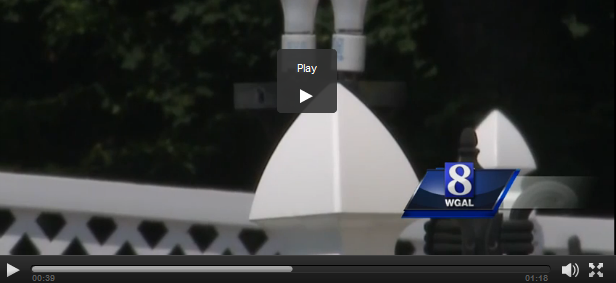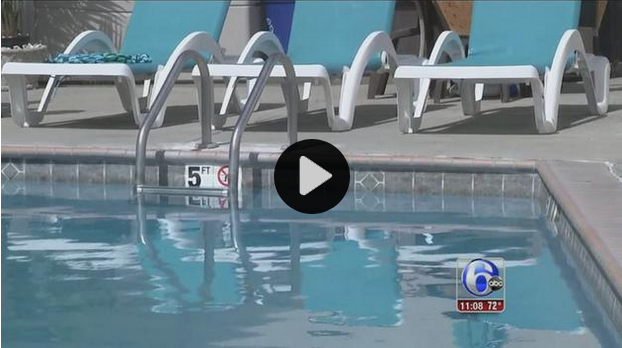
|
| Additional Tragic Accidents After Being Shocked in Swimming Pools |
|
|
|
Two additional accidents have been reported in the last week since our newsletter on Swimming Pool Safety, and we pray for their recovery.
8-Year Old Girl Shocked in Backyard Pool
The girl shocked in a backyard pool in Silver Spring Township Sunday evening remains in critical condition, police said Monday.
The accident happened at a home on Rockledge Drive in Silver Spring Township. There were eight children in the pool at the time.
Police said one of the children flipped on a switch to turn on the pool lights when there was a malfunction. All of the children in the pool felt a shock, but the 8-year-old could not get out and went into cardiac arrest. Firefighters performed CPR and used an AED to revive the child. She was flown to Penn State Hershey Medic al Center where she remains in the Intensive Care Unit. |
Mike Holt's Comment: This is why you should NOT have a powered light in your pool. If you do, then you should have it disconnected by a qualified Electrical Contractor, or replaced with a Fiber Optic Light (no electric power).
Man Critical after Electrical Shock in NJ Motel Pool
WILDWOOD CREST, N.J. (WPVI-TV) —A man is in critical condition after an electrical shock in a motel pool in Wildwood Crest, New Jersey. Witnesses say 34-year-old Greg Subiszak was spotted face down in the Aztec Motel pool Saturday night in the town of Wildwood Crest.
Unaware what had happened 17-year-old Ivan Christopher Martinez of Camden, jumped in the water to save the man. He tells WPVI-TV that his body tensed up and began shaking after jumping in. A maintenance worker eventually turned off the electricity and pulled Subiszak from the pool. A motel guest administered CPR until paramedics arrived. Subiszak is hospitalized in Philadelphia.
Motel owner Adamo Pipitone says the pool will stay closed until it's cleared to reopen by county health officials. He speculates a short in a lamp post is to blame.
Police are investigating. |
Mike Holt’s Comment: Before you consider checking a swimming pool for proper bonding and grounding, please ensure that you understand electrical fundamentals, grounding versus bonding, NEC requirements related to swimming pool bonding, Neutral-to-Earth (NEV) voltage related to utility wiring, and how to troubleshoot to ensure swimming pools are properly bonded. All of these topics are available for free on our Swimming Pool Bonding page located at - http://www.mikeholt.com/swimmingpoolbonding.php.
|
|
|
|
Visit:
Exam Preparation
|
Continuing Education
|
Code Products
|
Newsletters
|
and more
|
|
|
| Copyright© Mike Holt Enterprises of Leesburg, Inc. All Rights Reserved This article is protected by United States copyright laws and may not be published without prior written permission. |
| Mike Holt Enterprises of Leesburg, Inc. 3604 Parkway Blvd. Suite 3 Leesburg, FL 34748 |
|
"... as for me and my house, we will serve the Lord." [Joshua 24:15]
|
|
|
Comments
|
A continuity test of all bonding and grounding should be a requirement forced on the contractor before anyone can say a pool is safe to go in many of these contractors go pull a permit and relay on the actual electrician the Inspector is the last line of defense and he is not their all the time to see actual installations.? Jose A. Guillen June 11 2016, 4:29 pm EDT
Reply to this comment |
UL1310 and UL8750 and UL5085-3 clearly indicate requirements for Class 2 and Class 3 in wet and dry environments. The NFPA should copy the construction requirements of these standards to article 680 *verbatim*, as article 725 does not adequately define power-limited equipment for swimming pools or jacuzzi. Hazardous voltage or power levels for these areas should had never been considered acceptable.
Talked to a building code writer once and subsequently went home to beat my head against a brick wall for a few minutes... Brian June 8 2016, 1:13 pm EDT
Reply to this comment |
My inground pool light assembly has shorted out. It was 120 V 500w. Is the 12v DC option safe? The pool maintenance company stated that the GFI should protect us with the 120 V. Mark Melni June 8 2016, 11:21 am EDT
Reply to this comment |
Reply from: Mike Holt June 8 2016, 2:59 pm EDT
I would not recommend lighting in a swimming pool other than Fiber Optic. Who told you that GFCIs are safe don't know what they are saying...
Reply to Mike Holt |
As a contractor and home inspector in S Florida for 20 years I can't tell you how many times I have found pools that were not bonded properly.
If I had a nickle for every time I did a re-inspection of repairs and found an "electrician" (most of the time with a paid receipt)had come out and installed a ground rod and connected it to the bonding lug on the pool pump I wouldn't have to work any more. One guy used stranded #8 and literally wrapped around a section of chain link fence with his fingers 2 ft away no clamp.
I would have to say based upon my experiences that most electricians know nothing about pool bonding because I refuse to believe they are that uncaring and incompetent. David June 8 2016, 9:16 am EDT
Reply to this comment |
Reply from: Mike Holt June 8 2016, 9:43 am EDT
I think you are 100% right, electrician's care, they just don't know. But there was no source that could help them. Now there is a web page with four hours of video. No more excuses...
Reply to Mike Holt |
Regarding the wildwood occurrence. This pool was passed by the local ahj. Maybe jobs should be taken more seriously. Joe June 8 2016, 8:11 am EDT
Reply to this comment |
We will never be free from shotty or dilipidated electrical work as long as the do-it-yourselfers and unqualified/ uneducated folks attemp to play electrician. Maybe it should be written that an E-stop and shunt trip breaker be installed on all pools. If there was a E-stop push button in a readily accessable location, it would allow for a quicker response from confused bystanders.
Thank you for reading. Scott Osteen June 8 2016, 8:04 am EDT
Reply to this comment |
Although Mike puts heavy emphasis on bonding I have found countless violations of good practice. Electricians should understand the a bond that has a 10 ohm resistance across it can cause heavy damage or death. A solid bond should have less than 1 ohm resistance. In the case of grounds on VSD a 2 ohm bond could cause current flow through the motor bearings thereby destroying them.This is why the code only permits specific screws to be used in bonding. Self piercing sheet metal screws are a no no. Remember aluminum almost always has a resistive oxide coating. Use the proper precautions when bonding to it. Of course copper does too but it less resistive. Bob June 7 2016, 7:42 pm EDT
Reply to this comment |
|
| |
|
|


